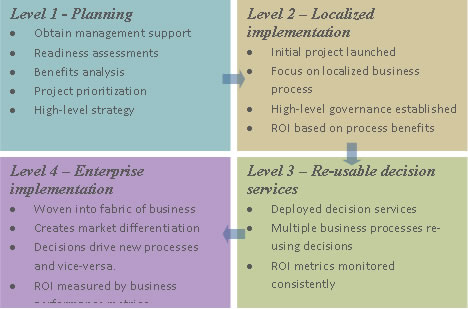Despite the growing number of success stories testifying to the positive business-transforming effects of Decision Management, many companies struggle to reach an implementation maturity level that generates continual value.
Research shows that there are common challenges that companies face when adopting Decision Management. We worked to understand the difference between companies able to overcome these challenges versus those who were not. What we have seen is a fundamental difference in the way successful companies excel in managing the organizational, technological and resource impacts of an adoption initiative.
This document presents 10 of the most common adoption challenges. By addressing these challenges head-on, successful adopters are able to accelerate their initiatives and create measurable and sustainable ROI.
Even though decisioning technologies have been available for quite some time, Decision Management is a fairly new discipline. However various factors are contributing to its viability as a robust solution to managing strategic decision-making assets. First, the speed of market change has prompted a need for more effective and efficient changes to strategic business logic. Second, computing power makes more memory-intensive applications accessible to desktops and servers. And third, business people are more comfortable using technology to perform their day-to-day tasks. These factors, among others, have enabled companies to achieve differentiation and competitive advantage by better managing their processes, events and decisions.
Decision Management is more than a technology. It is a way of doing business. It requires an adoption, not just an implementation. Decision Management adoption success can be classified in one of four levels. The highest level (Level 4) characterizes an adoption where Decision Management is woven into the fabric of the business. ROI is calculated based on business performance and competitive advantage.

Realistically very few companies have achieved level 4, yet some are well positioned to get there. Their organization, strategies and governance enable them to address barriers to a successful enterprise-wide implementation. However others struggle to move beyond level 2, and in some cases level 1. They ultimately either abandon their initiative or remain stagnant with a localized implementation that solves the problems of one business process. The good news is that given time, enterprise-wide adoption of Decision Management is attainable from any level. For all companies, understanding, addressing and overcoming adoption challenges is a critical step toward success.
Our research and experience have identified the following 10 common barriers to successful enterprise-wide Decision Management adoption.
- Infrequent and late ROI. Executives have become weary with the promises of game-changing technologies. ROI never seems to measure up and new demands on resources put day-to-day tasks at risk. Decision Management adoption requires executive support to sustain momentum. Showing ROI soon and often helps justify time and resource investments for the initiative.
- No organizational incentive. Successful adoption of any technology partly depends on the motivation of people to embrace it. Education can help people understand the benefits; however education may not be enough. Consider rewards for business units and IT teams that implement reusable decision services for instance; or allow cross-charging of project costs. Awards and recognition based on cost, time and resource savings are also valuable incentives.
- No adoption strategy. Defining an adoption strategy is a critical component of level 1 adoption. A robust roadmap and adoption blueprint help define a path that maximizes ROI, establishes governance, and provides the foundation for future levels of adoption.
- Underestimated organizational impacts. Decision Management adoption requires more than assembling a team with the appropriate technical skills. Impacts reach the organizational and infrastructure levels where success requires the support and experience of both technical and non-technical resources.
- Lack of a supporting architecture. Reaching the higher levels of Decision Management adoption requires an application architecture that supports decision service re-use across business processes. Development of the architecture foundation should be coordinated ahead of Decision Management adoption progression.
- Unclear benefits. Clear and precise benefits should be framed for continual focus, or risk the initiative being classified as another big-budget, low ROI spending spree. Competitive advantage, lower cost of ownership and faster time to market are measurable characteristics of Decision Management implementations.
- Too little or too much governance. Too little governance creates unmitigated risk, unquantifiable measurements, lack of ownership and inconsistent standards. Equally important, too much governance stifles momentum leading to a lack of support and trust. Governance requires balanced control and oversight.
- Too much focus on rules. Decision Management should focus more on managing decisions, not rules. Competitive differentiation is based on how a company makes decisions, not the rules involved in the decisions.
- Resource needs not addressed. Decision Management requires business managers to acquire new resources and skills. Insufficient training and education leaves the business function unprepared to analyze, author, test and promote decisions.
- Lack of communication. Unsuccessful adoption initiatives typically lack communication necessary for gaining and sustaining momentum. Continuously promoting wins, ROI and benefits to the business ensures the right people have the right motivation to champion the adoption initiative.
Understanding, addressing and overcoming adoption barriers enables the creation of sustainable momentum, and momentum is what propels us to higher levels of adoption. Consider these thoughts as you plan and execute your Decision Management adoption initiative. Good luck.

















